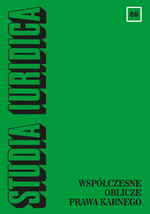Przedstawiciel społeczny w transparentnym procesie karnym
Social Representative in Transparent Criminal Proceedings
Author(s): Paweł CzarneckiSubject(s): Law, Constitution, Jurisprudence, Criminal Law
Published by: Wydawnictwa Uniwersytetu Warszawskiego
Keywords: social representative; principle of open proceedings; Criminal Law Codification Commission; Code of Criminal Procedure Amendment of 10 June 2016; interests of justice; the community organisation
Summary/Abstract: The article analyses the rights and duties of a social representative in criminal proceedings (article 90 Code of Criminal Procedure). Participation in court proceedings may be declared, before the commencement of judicial examination, by a representative of a community organisation, if there is a need to defend a social interest or an important individual interest within the statutory purposes of such an organisation, especially in matters pertaining to the protection of human rights and freedoms. The representative of a community organisation who has been admitted to participate in court proceedings may participate in the trial, express their points of view and make statements in writing. The court shall admit a representative of a community organisation if it finds this to be in the interests of justice. This person shall not be allowed to ask questions to person questioned by the court, he has no right to make a complaint with the court, can`t submit motions for evidence and are not entitled to participate in a session or in an investigation. The author emphasizes the importance of participation by the citizenry in the administration of justice principle and the right to a fair and public hearing of his case. In article they were also discussed old draft bills in the position of social representative in criminal cases, and in particular the advantages and disadvantages of amending article 90 c.c.p. Amendment of 10 June 2016. The author argues that the changing of position will not increase the participation of the public in the proceedings, because the legislature did not admit procedural rights.
Journal: Studia Iuridica
- Issue Year: 2017
- Issue No: 69
- Page Range: 21-37
- Page Count: 17
- Language: Polish

